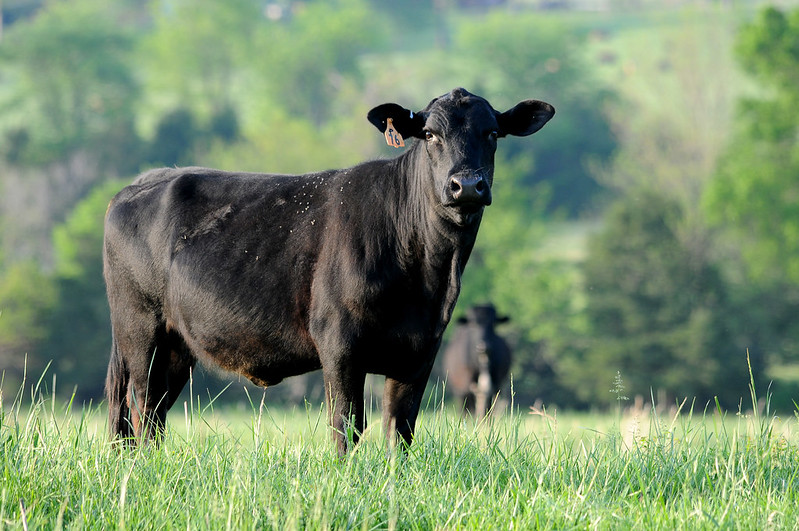Nov. 12, 2021
Grass to Grid program helps cow-calf operations access feedlot benefits, data
By Ryan McGeeney
U of A System Division of Agriculture
Fast Facts:
- Program sends Arkansas calves to out-of-state feedlots for grain finishing
- Data from feedlots helps producers understand ramifications of breeding choices
- Register at https://www.uaex.uada.edu/farm-ranch/animals-forages/beef-cattle/grass-to-grid.aspx
(322 words)
LITTLE ROCK — The University of Arkansas System Division of Agriculture is offering Arkansas cattle producers — particularly those running smaller cow-calf operations — the opportunity to gain insight into herd genetics through participation in large finishing operations.
VALUE IN DATA — The Grass to Grid program allows participating producers a chance to send a small number of steers and heifers to an out-of-state feedlot, where they will be grain-finished on high-nutrient feed before processing. Once the animals are slaughtered, the producers will receive data on the beef to help them understand how breeding choices on the farm bear out in the final product. (Division of Agriculture photo.)
The Grass to Grid program allows participating producers a chance to send a small number of steers and heifers to an out-of-state feedlot, where they will be grain-finished on high-nutrient feed before processing. Once the animals are slaughtered, the producers will receive data on the beef to help them understand how breeding choices on the farm bear out in the final product.
Shane Gadberry, professor of ruminant nutrition for the Division of Agriculture, said that the beef industry in the United States is so segmented that smaller cow-calf operators often never have the opportunity to see how their products fare against those from other operations.
“It’s an educational opportunity for Arkansas cow-calf producers to see how the genetics of their calves stack up,” Gadberry said. “Do they grade USDA Choice that’s on the familiar label at the grocery store, or does the quality of beef differ from what consumers are used to purchasing?
“Producers can use that data to make management changes to their herd,” he said. “That may mean buying a new bull.”
The deadline for registering for the program is March 1, 2022. There is a $5 per head fee, which covers ear tagging and other operational costs. Participants must enroll a minimum of five mixed-sex or three same-sex calves, and calves must weigh between 500-800 lbs. There is no maximum entry.
While Arkansas has many cow-calf producers, Gadberry said, there are virtually no feedlots in the state. The Division of Agriculture ran a previous version of the Grass to Grid program until 2014. Gadberry said the program is being revamped in response to interest from a new generation of Arkansas cow-calf producers.
To learn about extension programs in Arkansas, contact your local Cooperative Extension Service agent or visit www.uaex.uada.edu. Follow us on Twitter and Instagram at @AR_Extension. To learn more about Division of Agriculture research, visit the Arkansas Agricultural Experiment Station website: https://aaes.uark.edu. Follow on Twitter at @ArkAgResearch. To learn more about the Division of Agriculture, visit https://uada.edu/. Follow us on Twitter at @AgInArk.
About the Division of Agriculture
The University of Arkansas System Division of Agriculture’s mission is to strengthen agriculture, communities, and families by connecting trusted research to the adoption of best practices. Through the Agricultural Experiment Station and the Cooperative Extension Service, the Division of Agriculture conducts research and extension work within the nation’s historic land grant education system.
The Division of Agriculture is one of 20 entities within the University of Arkansas System. It has offices in all 75 counties in Arkansas and faculty on five system campuses.
Pursuant to 7 CFR § 15.3, the University of Arkansas System Division of Agriculture offers all its Extension and Research programs and services (including employment) without regard to race, color, sex, national origin, religion, age, disability, marital or veteran status, genetic information, sexual preference, pregnancy or any other legally protected status, and is an equal opportunity institution.
# # #
Media contact:
Ryan McGeeney
Communications Services
University of Arkansas System Division of Agriculture
Cooperative Extension Service
(501) 671-2120
rmcgeeney@uada.edu
